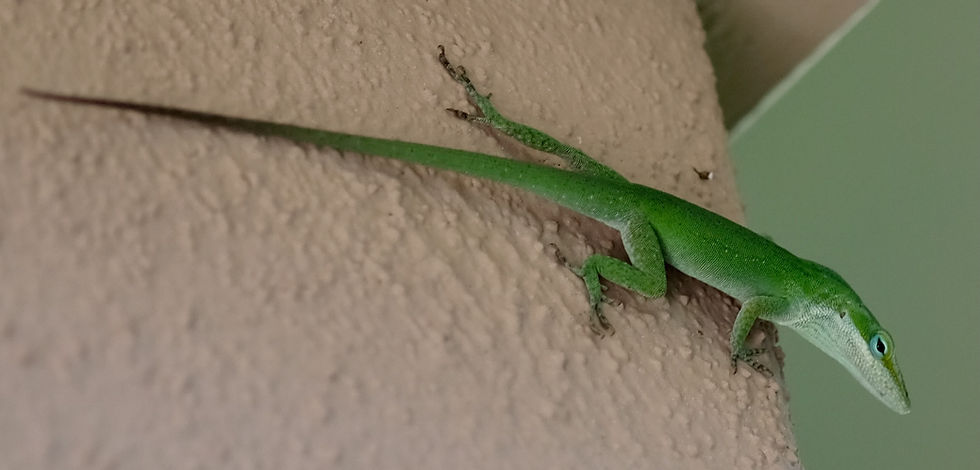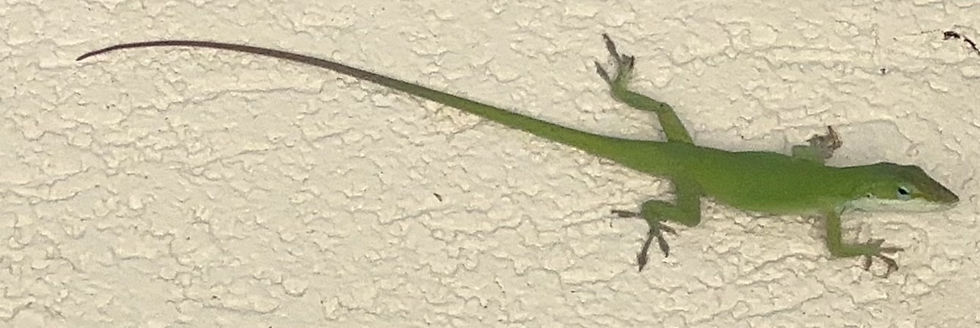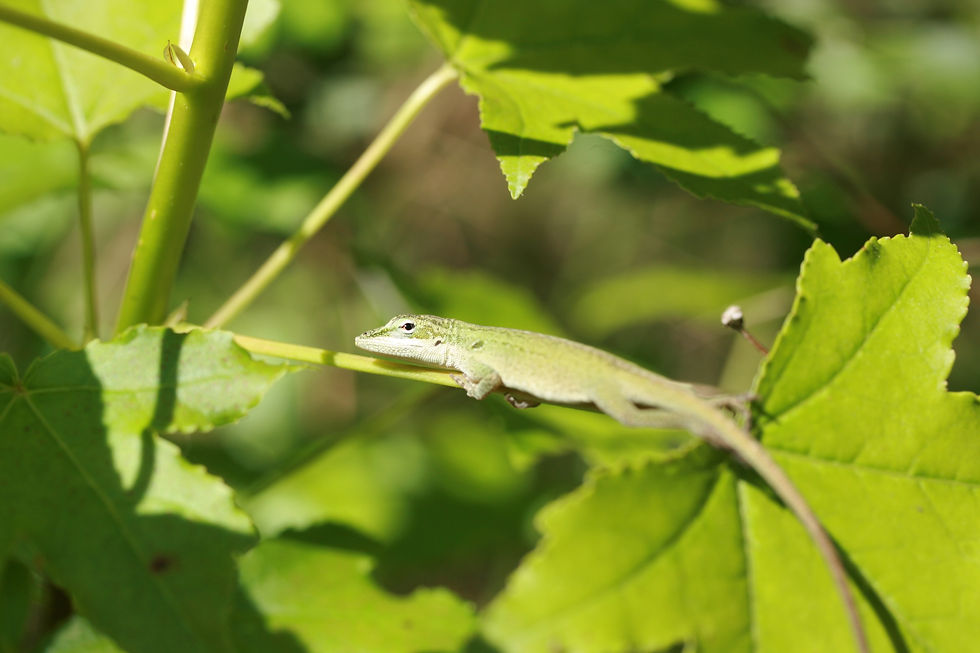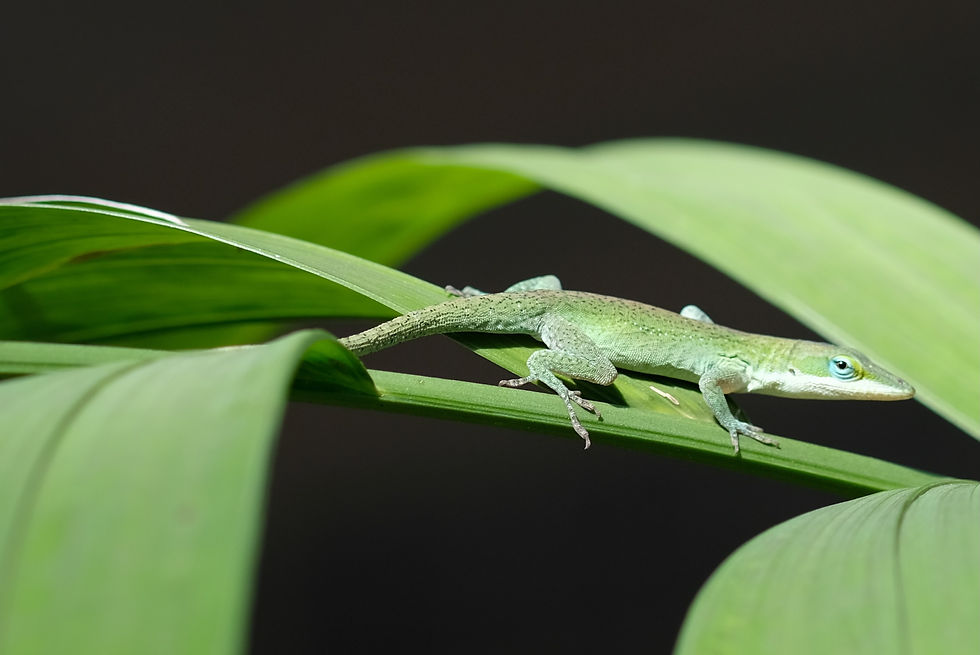Lawrence the Green Anole's Debut
- Katherine Dudley Hoehn
- Apr 30, 2024
- 6 min read
Updated: Jul 9, 2025

Lawrence has been a part of my household for a few years. It is altogether possible that there are several Lawrences, but that is not important to this telling. He was named Lawrence after he kept appearing at my front door, resplendent in his bright green coat and shiny white belly and occasionally flashing his very red dewlap (that is the flaring loose skin below his chin that indicates excitement). He needed a name.
Always curious, he sits on the driftwood sculpture created by Homosassa artist, Kevin Jenkins, observes me, and takes care of some of the bugs that gathered around the porch light in the evenings.

I told my grandson, Henry, about him and began sending Henry postcards from Lawrence. Even though Henry is now approaching nine, we still occasionally catch up with news of Lawrence although he no longer believes Lawrence sends postcards.

Lawrence is featured on the cover of a new anthology in which his and many other stories are collected, Encounters With Nature, by Amelia Island Writers and Artists. His portrait is beautifully painted by the very talented artist, Janet Michea, who also admits having on occasional chat with a green anole and delighting in their quizzical look as they listen attentively.
The book – a bargain at $18 and currently available at Story & Song Center for Arts and Culture on Amelia Island or their online store – will soon also be available in other local shops and on Amazon. It will also be sold at the Keep Nassau Beautiful booth at the Wild Amelia Nature Festival on May 18. It’s filled with art by local artists (including two other lizard portraits by Barb Wylie and Mary Libby) and lots of stories you’ll want to read about the natural world of Amelia Island. Below is Lawrence's story. Buy the book to read more about bobcats, pelicans, sharks, birds, wild horses, and more. All proceeds benefit Keep Nassau Beautiful.
Lawrence the Green Anole
from Encounters With Nature, by Amelia Island Writers & Artists
Amelia Island has a rich supply of green anoles. These speedy racers can be found anywhere there are bushes, trees, dead leaves, undergrowth and bugs. They are as prevalent in residential areas, where they may have fewer natural enemies to contend with, as they are in the woods. Visitors from outside the south are unaccustomed to them because green anoles cannot survive in the cold. Gentle creatures with a general curiosity and territorial nature, they are very good welcome agents for visitors to Amelia Island.
One of my favorite green anoles is Lawrence. A large male, he lives on the driftwood sculpture on my front porch. This is his story. He hopes you will understand him better, recognize and help protect his kind, and never ever confuse him with a gecko or chameleon.
Lawrence’s Story
My name is Lawrence. I am a green anole, also known as a lizard. One of my cousins works for an insurance company. He is a green anole but goes by the name Gecko. Don’t let his error, or refusal to acknowledge his heritage, confuse you.
I am not a chameleon. While I’m able to change my outfit, I only have two colors – brown and a beautiful green – and I only change my colors according to my mood, health, the humidity level, or temperature. Chameleons do that, too, but also have more colors and change them to match their surroundings or blend in.
I was born under the leaves in the mulchy part of the garden. My mom laid about 18 eggs under leaves, in different parts of the garden, over a period of a few weeks. I don’t know my brothers and sisters, my mother, or my father.
From the moment I was born, I began to search for food. I am an avid hunter and eat 5 five or more cricket-sized insects every day (or lots more ants). I might have a spider for breakfast, a rollie-pollie (pill bug) for a morning snack, a couple of worms or a caterpillar for lunch, and a roach, ant, or cricket later in the day. I am an eating machine and your free pest control! My friends and I spend all day working, trying to rid humans’ yards and the surrounding forests of unwanted pests, one bug at a time. We even eat termites.
Most people do not appreciate us for the work we do. They see our sleek and beautiful bodies and they might be afraid, which is ludicrous. We might bite if you try to grab us, but our teeth are not sharp enough to break the skin. When we stop being afraid, we will turn green again. If we keep being afraid, we may drop our tails. Those of us who lose our tails are considered to be very valiant because we faced adversity and survived. I have lost a couple of tails in my life, and they just grew back. In the interim, I get attention from the ladies and a bit more respect from the guys.
I don’t care for other dudes, and we are all very territorial. We have about three square yards in which we do most of our hunting, sunning, hiding, and sleeping and we do not like others messing with our space. When they do, it can get ugly. I have this awesome thing called a dewlap that is a reddish colored fan below my chin. When I get annoyed or need to look fierce or impress a gal, I flash it. Other guys know this means I am challenging them not to encroach on my territory. I am a pretty good warrior since I have survived many fights and lost a couple of tails.
The food chain can be very unfair. Birds and snakes are the enemy and we have to stay out of their way or else become their dinner. I can see moving things at more than 180-degrees, so my eyes have helped me escape more than a few vicious birds.
We also have enemies that are a sort of uninvited cousin. Cuban brown anoles came to our land about 100 years ago, probably piggy-backed on some plants. These freeloaders are a bit larger than we are (we are usually 5-8 inches long) and are very aggressive. They eat our young, pick fights with us and try to take over our territory. The humans say that these uninvited border crashers are now in all parts of Florida. Being the more intelligent ones, we have figured out that if we move to higher elevations (trees, bushes and even fences), we can stay clear of them, although it is unfair that we were here first and must move. Over time we have evolved to have bigger, stickier toes that allow us to climb higher and thrive above the ground and into the trees.
At my human’s house, there are several other green anoles and, except for mating season, we all avoid one another. Martin lives in the mailbox and one day had a terrible run-in with the mailman. When he was trying to protect his territory from several large envelopes, the mailman slammed him in the door. When my human came out to collect her envelopes, she saved him from losing more than his tail. Seth lives in a light fixture in the front yard. He has a bit of a haughty attitude and I never go anywhere near his residence. It is often filled with bugs in the evening, so he eats well.
Amelia Island is an awesome place for a southern gentleman like me. The weather is perfect. My kind are reptiles, also known as cold blooded. We need daytime temperatures of 70-85 degrees, and, like Amelia Island beachgoers, we bask comfortably in 90-95 degrees in the sun and love humidity. We help islanders know when winter is turning to spring because we emerge from our warm winter hiding places to bask on rocks, pavements, fences, and plants to soak up the midday heat of the sun. It seems that humans from colder places do very much the same thing, traveling from the north in the winter months to Amelia Island to warm themselves.
I relish my Zen time in the sun, close my eyes and soak it up. When interrupted, I am apt to turn brown, flash my bright red dewlap, add a few neck thrusts, and scare the pants off invaders.
If you see us on a porch screen, or running across your sidewalk, it is for a noble purpose: guarding territory, sunning ourselves, or hunting. You will notice us in the same places day after day, because we have our territory to protect. If you see two green anoles with their dewlaps erect, you will know that we are about to have a fight and that it is probably over territory.
Please consider a few simple things that will help keep us around a bit longer, keep those annoying bugs away and entertain your island visitors and small children. 1) Leave us alone; don’t try to catch us. Let us do our work in your garden. 2) Keep cats indoors. They stalk us and leave our dying bodies in their wake. If cats were smart enough to discriminate, I would suggest you just ask them to catch cuban brown anoles, but cats never do what they are told; 3) Plant and nourish the trees and high bushes that have become our habitat as we have been pushed out of our old homes; and 4) Stop using pesticides. Pesticides kill our food, and we get very sick or die if we eat the poisoned insects or step in the poison. Also, pesticides kill bees and bees are everyone’s friend.
We’re happy to share our home with you and don’t ask for a whole lot in return. We hope to be around to watch your children, grandchildren, and great grandchildren enjoying our natural habitat. We’re doing our part to keep it beautiful (and bug free).







Katherine,
What a wonderful story. I am so excited that you are being published.
Blessings,
Shelley
Kat, I loved how you made Lawerence a character in your story and incorporated nature throughout.
It is a beautiful story, and I want to hear more from Lawerence.
LAS
Kat, you continue to amaze!
I will buy this book to read more of your stories Kat ! So good !